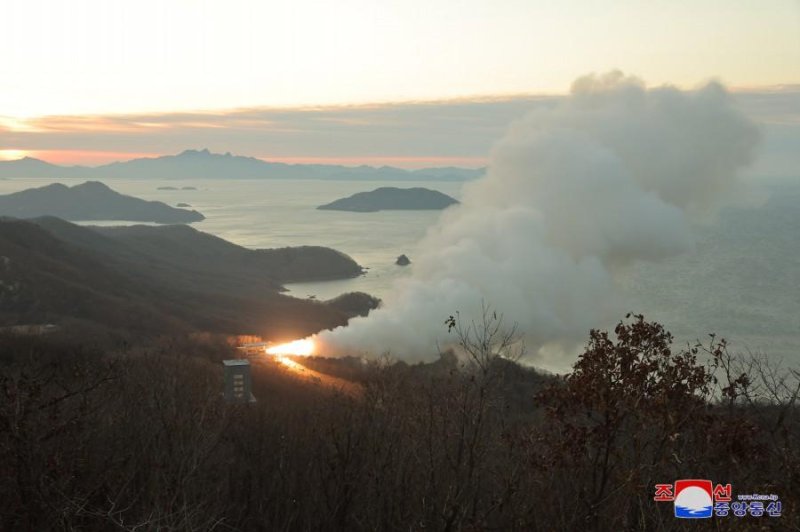North Korea claimed Wednesday that it successfully tested a new solid-fuel engine for intermediate-range ballistic missiles. Photo by KCNA/UPI
SEOUL, Nov. 15 (UPI) -- North Korea tested a "new-type high-thrust" solid-fuel engine for intermediate-range ballistic missiles, its state-run media said Wednesday, as Pyongyang continues to develop its banned weapons program amid escalated tensions on the Peninsula.
The North successfully conducted a test of the first-stage engine on Saturday and the second-stage engine on Tuesday, Korean Central News Agency reported.
The tests of the solid-fuel engines "provided a sure guarantee for reliably accelerating the development of the new-type IRBM system," the KCNA report said.
The regime's General Missile Bureau said the tests "are an essential process for further enhancing the strategic offensive capabilities of the DPRK's armed forces in the light of the grave and unstable security environment facing the country and the future military situation in the region," KCNA added.
The Democratic People's Republic of Korea is the official name of North Korea.
An intermediate-range ballistic missile, such as North Korea's existing liquid-fuel Hwasong-12, has the range to reach U.S. military bases in Japan and Guam.
Analysts say that rockets using solid-fuel propellants are more maneuverable and quicker to launch than liquid-fuel models, presenting greater challenges for missile defense systems.
Earlier this year, the North tested its first solid-fuel intercontinental ballistic missile, the Hwasong-18, which has the potential range to strike anywhere on the United States mainland.
The announcement came as a Russian delegation led by Natural Resources Minister Alexander Kozlov arrived in Pyongyang for talks on trade and technology cooperation, KCNA reported.
Kozlov said that North Korea is standing "shoulder to shoulder" with Moscow and has "extended full support to Russia over the regional and international issues," according to KCNA.
Moscow and Pyongyang have strengthened military cooperation in recent months, which U.S. Secretary of State Antony Blinken last week called a "growing and dangerous" connection.
The White House has said that Pyongyang is sending artillery and equipment to Moscow for its war in Ukraine, while the North is believed to be receiving advanced technology for its military programs, including a planned spy satellite.
The United States and South Korea on Monday unveiled a new tailored deterrence strategy meant to respond to the North's mounting missile and nuclear threats and its growing military ties with Russia.
The allies have also ramped up their joint military exercises, with Washington regularly deploying strategic assets to the Peninsula as part of its "extended deterrence" guarantee against North Korean nuclear attacks.
On Wednesday, two U.S. B-52H nuclear strategic bombers took part in a joint air drill with South Korean fighter jets over the Yellow Sea, Seoul's Defense Ministry said.















